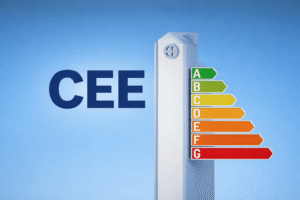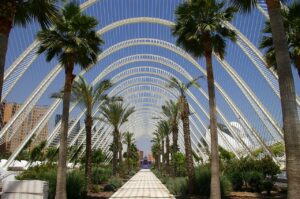Introduction
Energy renovation is the major new real estate issue in Spain. Owners and tenants are all affected. The country is indeed facing major environmental challenges and rising energy costs, like most countries in the world, but these difficulties are accentuated by the poor quality of an aging building stock: 80% of homes need to be renovated even if only 8.5% of listings mention it.
Improving the energy efficiency of buildings is therefore the number one priority. To help you see more clearly on this "burning" issue, the experts at Terreta Spain have developed this complete guide to energy renovation in Spain.
What is energy renovation?
Definition
First, let's define the concept; this energy optimization encompasses all types of work and improvements aimed at enhancing the energy efficiency of an existing building. The goal is to kill two birds with one stone by drastically reducing household energy consumption and improving the comfort of occupants.
Specifically, what solutions should be considered to achieve this?
- Insulating the walls and roof
- Changing windows
- Installing more efficient heating and air conditioning systems
- The daily use of green energies, such as rainwater harvesting, solar energy, geothermal energy or biomass
- Wind and hydroelectric power in the case of housing built in areas exposed to wind or near water
The importance of energy renovation in Spain
In Spain, thermal retrofitting is absolutely crucial, and for several reasons:
- The country must reduce its energy dependence:
Spain imports a large part of its energy, which makes it vulnerable to fluctuations in international prices. The energy crisis was thus revealed in broad daylight with the war in Ukraine. In 2022, its level of dependence was more than 74% according to Eurostat. After considerable efforts, in 2023, dependence fell to 68%, but there is still a long way to go.
- The country and the European continent have made the fight against climate change a priority:
The construction sector is responsible for 40% of energy consumption at the European level. In Spain, nearly 60% of buildings were constructed before the first regulation introducing minimum energy efficiency criteria (the NBE-CT-79 standard). The country must comply with the objectives set by the EU, and energy renovation is now a priority for reducing greenhouse gases.
- The comfort of housing must be improved:
Contrary to popular belief, the Spanish climate is contrasted: hot, humid areas, others colder, etc. Good thermal insulation is necessary in summer and winter for the comfort of occupants.
Focus: renovation and energy efficiency at the European level
Let's delve deeper into this point to fully grasp the stakes of energy renovation in Spain: what are the EU's demands?
- Reduction of greenhouse gas emissions: the goal is to reduce emissions by at least 55% compared to 1990 levels by 2030 and to achieve carbon neutrality by 2050.
- Energy efficiency: the EU aims to improve energy efficiency by just over 30% by 2030.
- Renewable energies: the target has recently been revised upwards, and the EU is advocating for the share of renewable energies in final energy consumption to reach 42.5% by 2030.
- Energy performance of buildings: The Energy Performance of Buildings Directive (EPBD) requires all new constructions to have nearly zero energy consumption from 2028 onwards.
- Renovation of existing buildings: the EU strongly encourages the renovation of existing buildings to improve their energy efficiency. It aims to double the rate of energy renovation by 2030.
Energy renovation in Spain: what are the legal obligations and standards to be aware of?
European standards and regulations
Like other European countries, Spain must comply with EU directives on the energy performance of buildings so that the continent can meet its targets for reducing energy consumption and CO2 emissions. Here are the details:
- Directive 2010/31/EU on the energy performance of buildings.
- Directive 2012/27/EU on energy efficiency.
Specific local regulations by region
Each autonomous community may have its own additional regulations. For example:
- In Madrid, the Air Quality and Climate Change Ordinance encourages the energy renovation of buildings;
- In Catalonia, Decree 28/21 amends the Catalan Civil Code to simplify the adoption of energy works in co-ownerships.
- The Basque Country is known for having some of the most advanced energy efficiency standards in the country.
National regulations
Regardless of the variations between the autonomous communities, Spain has put in place a common base of energy regulations that apply uniformly across the entire territory to improve the energy efficiency of the Spanish real estate stock:
- The obligation since 2013 to present an energy performance certificate (EPC) when selling or renting a property.
- By 2033, all homes put up for sale or rent must have at least a class D energy certificate.
Are you considering energy renovation work? Contact Terreta Spain, your trusted partner.
Why invest in energy renovation in Spain?
Economic and ecological advantages
Is it necessary to specify? The advantages of investing in energy renovation are numerous.
This allows you to:
- Achieving substantial savings on energy bills:
Estimates vary, but IDAE (Instituto para la Diversificación y Ahorro de la Energía) has calculated that a complete energy renovation could save 50 to 80% on the annual bill.
- Reducing the carbon footprint:
When properly executed, an energy renovation can reduce a building's energy consumption by 40% to 70%.
- Increasing the value of the property and its rental yields:
This is a mechanical effect and an essential point for investors. An energy-renovated property sees its value increase significantly on the real estate market. It is estimated that properties that consume less energy rent faster and for more (10 to 15%) and sell for 10% more than non-renovated and inefficient properties.
- Being in compliance with local regulations:
The Spanish Building Technical Code (CTE), updated in 2019, is increasingly strict regarding energy efficiency for new and renovated buildings.
Terreta Spain's advice: undertake these works as soon as possible; you will benefit in every way. Terreta Spain is your renovation partner in Spain; contact us to arrange an audit.

Grants and subsidies for energy renovation in Spain
Subsidies from the Spanish government
The Building Energy Rehabilitation Program (PREE)
Through the Institute for Diversification and Energy Saving (IDAE), which reports to the Ministry for Ecological Transition, this aid program for the energy rehabilitation of existing buildings covers various improvements, such as:
- Modernizing the thermal envelope (e.g., replacing windows);
- Installing efficient heating and cooling systems;
- Replacing fossil fuel-based thermal production with renewable sources;
- Using regulation and control technologies;
- Improving energy efficiency through lighting.
The amount of IDAE aid for improving the energy efficiency of homes and buildings varies depending on the nature of the work:
- Residential buildings: 20% to 50% of the costs can be subsidized.
- Individual dwellings or commercial premises located in buildings: between 20% and 40%.
- Aid for actions improving the energy label by reaching the two upper levels (A or B) or by advancing at least two letters
The aid program of the Ministry of Transport and Sustainable Mobility
It is intended for primary residences. The subsidy covers 40% of the cost of the works, with a ceiling of 3,000 euros per property, and a minimum cost of 1,000 euros. This aid is only granted if a reduction of at least 7% in the demand for heating and/or cooling and a 30% reduction in energy consumption are achieved.
Applications are made directly to the relevant town halls.
Next Generation EU Program
Via Next Generation EU, the European fund of more than 800 billion euros created in 2020, the European Union provides very substantial financial support for energy renovation in Spain (80 billion euros non-refundable by 2026 and the same amount in the form of credit). The country is one of the leaders in this transformation process.
Individuals can finance 40 to 80% of their energy renovation project. You can find more information by clicking on this link.
Regional aid for renovation
Some autonomous communities also offer aid for the energy rehabilitation of residential buildings and co-owned properties, for example:

Taxation of energy renovation
The portion of the work not covered by these subsidy systems may be eligible for up to 60% tax deduction.
Reductions in the Real Estate Tax (IBI)
- Some local administrations offer reductions on the IBI (property tax) for buildings or homes incorporating energy efficiency measures.
Reduction of the Tax on Constructions, Installations and Works (ICIO)
- This municipal tax, required for any installation or work requiring licenses, is also reduced in the event of energy improvements.
IRPF Deduction
- During the 2023 income tax campaign, all taxpayers who carried out improvement or rehabilitation work in their primary residence or in residential buildings to improve energy efficiency were able to benefit from deductions on the IRPF. These are maintained for 2024.
- Up to 20%, with a ceiling of 5,000 euros per year for actions reducing heating and cooling demand by at least 7%.
- Up to 40%, with a ceiling of 7,500 euros per year for a reduction of at least 30% in non-renewable energy consumption or for an improvement in the energy classification of the property, reaching one of the two highest classifications.
- Up to 60% for rehabilitation works that improve energy efficiency in buildings for residential use.
Please note: to apply this deduction in the income tax return, it is necessary to justify the works and present two energy certificates, one carried out before the energy improvement works, the other after.
The main techniques and solutions for energy renovation
Now that you understand the principle, let's get down to specifics. If you have just purchased a property or are about to launch your real estate project, here is what to consider in terms of energy saving work.
Thermal insulation of walls, roofs and windows
Thermal insulation is both the foundation and the keystone of any effective energy renovation. Without it, it is impossible to reduce heat loss in winter and overheating in summer.
How to insulate effectively?
- Insulating from the outside (External Thermal Insulation Composite System - ETICS), this avoids thermal bridges, improves thermal inertia and consequently the habitability and comfort of the property;
- Insulate the attic and roof;
- Install double or triple glazing. In France, ADEME states that this measure alone would reduce the energy bills of the properties concerned by 20%.
Installation of new-generation heating and air conditioning systems
Older heating and air conditioning systems are significantly less efficient than those currently available on the market. Furthermore, in Spain, most homes are not equipped with either.
The most energy-efficient options to consider are:
- Air-source heat pumps: these extract heat from the outside air to heat or cool interiors.
- Condensing boilers: these recover heat from combustion fumes, resulting in higher energy efficiency compared to traditional boilers.
- High-efficiency reversible air conditioning systems.
Use of renewable energy sources
Whenever possible, renewable energy should be prioritized. This will become increasingly easier in Spain. In 2023, the country produced 15% more renewable energy than in 2022, accounting for over 50% of the national electricity production.
Individuals can utilize the following renewable energy sources:
- Photovoltaic solar panels for self-consumption.
- Solar water heaters.
- Biomass systems.
- Rainwater harvesting systems.
Optimization of lighting and electrical appliances
- Switching to LED lighting and equipping your property with high energy-efficient appliances can complement your energy renovation project.
- For the less tech-savvy, installing a smart energy management system can also help optimize your consumption. Connected to the home network, this system monitors the consumption of each appliance in real-time and adjusts usage based on needs, occupant preferences, and energy prices. This will reduce your bills and environmental impact, while you (or your tenants) will enjoy optimal comfort.
What are the steps involved in the energy renovation process in Spain?
Convinced? Here are the steps to follow to renovate your new acquisition in Spain:
- Energy audit:
This allows you to evaluate the current energy performance of the building and identify weaknesses and opportunities for improvement.
- Work planning and solution arbitration:
You need to define your renovation objectives and select appropriate techniques and materials.
- Budget to establish.
- Schedule to define.
- Select qualified companies and professionals:
Please note that you need to look for certified companies for energy renovation. Never start before obtaining detailed quotes and proof of certifications.
- Execution of works:
As with all types of work, it is necessary to monitor the site and ensure compliance with current standards.
- Monitoring and evaluation of the renovation:
Don't forget to measure performance after the work is completed. This will allow you to make adjustments if necessary.
Don't go it alone, Terreta Spain is your trusted partner in Spain. Our specialists can assist you with the energy renovation of your property. Contact them.
And if you are looking for a comprehensive guide on renovation in Spain, read ours: "All you need to know about property renovation in Spain."

What are the costs and timeframes for energy renovation in Spain?
As with any type of work, the price of energy renovation varies considerably depending on the extent of the renovations undertaken and the initial condition of the building.
Here are some estimates based on IDAE data:
- Exterior wall insulation: 50 to 100€/m²;
- Double or triple glazed windows: 300 to 800 € per window;
- Installation of photovoltaic solar panels: 4000 to 8000 € for a standard residential installation.
It should be noted that these investments are partially recouped in the medium term thanks to the energy savings achieved.
Terreta Spain's advice: don't forget the possible additional costs:
- Building permits generally cost between 250 and 300 €/m2, but can exceptionally rise to 6000 € and vary depending on the municipality.
- Architect's fees are equivalent to approximately 10% of the total cost of the work.
- Energy certification costs between 100 and 300 € depending on the size of the property.
For a complete energy renovation of your property, allow approximately 3 to 6 months.
Energy renovation: mistakes to avoid
There are 4 major mistakes to avoid when undertaking an energy renovation project:
- Choosing solutions that are not adapted to the local climate:
As we have said, Spain has a diverse climate. Let's take a simple example: over-insulating in a hot region makes no sense, nor does failing to protect against humidity when living near the sea.
- Lack of prior audit and planning:
Without a thorough audit, there is no effective renovation. This essential step should not be neglected. It is this step that will allow you to identify your priorities and optimize your investments.
- Underestimation of costs and deadlines:
As with all work, deadlines and costs are always higher than expected. Your budget must be realistic, and you must allow a margin for unforeseen events. Delays and overruns are common, so take this into account in your schedule.
- Neglecting ventilation:
When undertaking insulation work, ventilation can prove to be a problem. Special attention must be paid to it to avoid problems with humidity and indoor air quality.
Conclusion
Energy renovation plays a decisive role in the transformation of the real estate stock in Spain. Owners who undertake an energy renovation will see the benefits on several levels:
- Bills will decrease
- The property will rent better, faster and at a higher price
- The capital gain will be greater
- They will be in line with the standards and needs of future generations
Don't hesitate to consult qualified professionals and find out about the aid available in your region to start your energy renovation project. There are many. With a well-planned approach and judicious choices, you can transform your home into a comfortable, energy-efficient space and boost its profitability.
Contact Terreta Spain to start your energy renovation project.
FAQ: Energy renovation in Spain, the complete guide
What is energy renovation and why is it important in Spain?
Energy renovation includes all work aimed at improving the energy efficiency of an existing building. It is crucial in Spain to reduce the country's energy dependence, combat climate change, improve housing comfort and comply with EU objectives.
What are the main benefits of energy renovation for owners?
The benefits include substantial savings on energy bills (up to 50-80%), a reduction in carbon footprint, an increase in property value and better rental yields.
What are the main energy renovation techniques?
The main techniques include thermal insulation of walls, roofs and windows, the installation of new generation heating and air conditioning systems, the use of renewable energies, and the optimization of lighting and electrical appliances.
Are there financial aids for energy renovation in Spain?
Yes, there are several aid programs, including the Building Energy Rehabilitation Program (PREE), subsidies from the Spanish government, regional aid, and European funds via the Next Generation EU program.
What are the tax advantages linked to energy renovation in Spain?
Tax advantages include reductions on the Real Estate Tax (IBI), reductions on the Tax on Constructions, Installations and Works (ICIO), and deductions on the IRPF up to 60% for certain energy improvement works.
What are the steps to follow for an energy renovation project?
The steps include an energy audit, work planning, budget establishment, selection of qualified companies, execution of the work, and post-renovation monitoring and evaluation.
What types of renewable energy can be used in an energy renovation in Spain?
Options include photovoltaic solar panels, solar water heaters, biomass systems, and rainwater harvesting systems.
How can energy renovation improve a property's value?
Energy-renovated properties rent faster and for more (10 to 15% more) and sell for approximately 10% more than non-renovated and inefficient housing.
Sources: Eurostat, Madrid 360, Ley Vasca de Sostenibilidad, European Parliament, ADEME, Wikipedia, Boletín Oficial del Estado, Next Generation, Junta de Andalucia, Habitatge Barcelona, Ministerio de Transportes y Movilidad Sostenible, IDAE, Energia Estratégica







